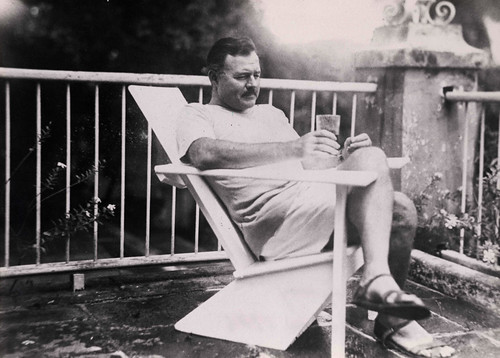Ernest Hemingway, affectionately known by a slew of nicknames including Ernie, Oinbones, Champ, and of course Papa, was born on this day in 1899. An amateur boxer and bullfighting aficionado, a hunting enthusiast and marrier of many spouses, and, first and foremost, a writer, Hemingway was also a coiner of words. Here are 10 he created or popularized.
byline
“I sorted out the carbons, stamped on a by-line.”
The Sun Also Rises, 1926
While Hemingway’s use is the earliest recorded in English, it’s unclear if he actually coined byline. In his early career as a journalist, he probably heard the term often, and merely popularized it through his first novel.
ciao
“‘Ciaou!’ he said. ‘What kind of time did you have?’”
A Farewell to Arms, 1929
Have a pretentious friend who says ciao instead of goodbye and hello? You can thank Papa for that.
The word ciao in Italian comes from the dialectal ciau, an alteration of (sono vostro) schiavo, “(I am your) servant.”
cojones
“It takes more cojones to be a sportsman where death is a closer party to the game.”
Death in the Afternoon, 1932
Cojones, Spanish for testicles, refers to courage, pluck, or guts. The word comes from the Latin coleus, culleus, literally “a leather sack.” Related in English are cullion, which in addition to meaning testicle refers to a vile person, and cull, a shortening of cully, a fool or dupe.
dirt
‘’Do you know any dirt?’ I asked. ‘No.’ ‘None of your exalted connections getting divorces?’”
The Sun Also Rises, 1926
Tabloids owe Hem a Green Isaac’s Special for giving them another word for gossip. An earlier figurative meaning for dirt is a mean action or remark, which could have been an influence.
moment of truth
“The whole end of the bullfight was the final sword thrust, the actual encounter between the man and the animal, what the Spanish call the moment of truth.”
Death in the Afternoon, 1932
Moment of truth, or a crucial point in time, comes from the Spanish bullfighting term, el momento de la verdad, which refers to the final thrust of the sword that kills the bull.
shit-faced
“Then some shitfaced critic writes Mr. Hemingway retires to his comfortable library to write about despair.”
Selected Letters, 1932
Hemmy uses shit-faced here to refer to a contemptible person. Poet Allen Ginsberg employs it in the same way in his 1961 poem, In Society:
She glared at me and
said immediately: “I don’t like you.”
turned her head away, and refused
to be introduced. I said, “What!”
in outrage. “Why you shit-faced fool!”
Shit-faced didn’t gain its intoxicated meaning until the early 1960s as “student slang.”
spooked
“He would get to worrying and get so spooked he wouldn’t be any use.”
To Have and Have Not, 1937
The original meaning of spook, a ghost or apparition, is from around 1801, and comes from the Middle Dutch spoc, meaning “ghost.” Spook gained the verb meaning “to act like a ghost” in 1867, and “to haunt” around 1883, says the Oxford English Dictionary.
In 1928, the word came to mean, in North American slang, to become alarmed. In 1935, Hemingway was the first to use spook to mean “to frighten or unnerve,” especially in hunting, and in 1937 he used spooked to mean scared or jumpy.
Spook as slang for “spy” is from 1942, perhaps with the idea of being hard to spot, while the derogatory term for a black person is from the mid-1940s. This might also come from the notion of invisibility, in this case the racist misconception that dark skin is “difficult to see at night,” says the Online Etymology Dictionary.
During World War II, African American Tuskegee airmen called themselves Spookwaffe, which translates from German as “spook weapon.” (See also Night Witches.)
stumblebum
“American word would be awkward bum, stumble-bum, flat-footed tramp.”
Death in the Afternoon, 1932
This term for a drunkard or a bumbling, inept person is also boxing slang for a punch-drunk or second-rate fighter.
The prizefighting usage is cited a couple of years after Hemingway’s, specifically in The Bruiser, a 1936 novel by American pugilist and writer Jim Tully: “Don’t let these palookers around here laugh you outta seein’ me go—all you’ll ever get outta these stumble bums is the holes in the doughnuts.” A palooka is also an untalented fighter.
to have been around
“We’ve all been around. I dare say Jake here has seen as much as you have.”
The Sun Also Rises, 1926
To have been around means to have experience in worldly matters. A variant is to have been around the block.
Yugo
“Maybe we can go over and fight the Yugos.”
Letter, April 27, 1919
Tatie seemed to be the first to use Yugo to refer to someone from Yugoslavia. The Yugo was also a mid-1980s car model “built in Soviet-bloc Yugoslavia.” Apparently the Yugo’s “engines went ka-blooey, the electrical system — such as it was — would sizzle, and things would just fall off,” at least according to TIME.
